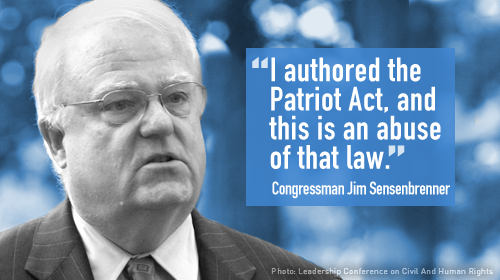
Over the last several months, members of Congress have introduced at least two dozen spying reform and transparency bills. Today, a new proposal called the USA FREEDOM Act from Rep. Jim Sensenbrenner (R-Wis.) and Sen. Patrick Leahy (D-Vt.) was introduced to significantly limit the collection and use of Americans' information under our nation's spying laws. The ACLU strongly supports the legislation.
The bill is notable for its sponsors alone.
Rep. Sensenbrenner was the lead author of the Patriot Act and now is the chair of the House's Subcommittee on Terrorism and Crime. A conservative member of Congress, he has repeatedly supported surveillance laws in the past, but now he's leading the charge for reform. According to Rep. Sensenbrenner, two consecutive White Houses have wrongly used his Patriot Act to collect the phone records of innocent Americans, and he wants it to stop. "This misinterpretation of the law threatens our First, Second and Fourth Amendment rights," Rep. Sensenbrenner recently said. "Congress never intended this. I will rein in the abuse of both the Patriot Act and the U.S. Constitution with the support of the American public."
Sen. Leahy is the chairman of the powerful Senate Judiciary Committee, which also has jurisdiction over the Patriot Act and FISA. He also believes the government's indiscriminate collection of Americans' records must end, because the "government has not made its case that this is an effective counterterrorism tool, especially in light of the intrusion on Americans' privacy rights."
The partnership between these two very senior members of the House and Senate, on both the left and the right, gives this bill legitimacy and a real chance at passing. But the bill has more than just names attached to it – it has substance.
It would amend Section 215 of the Patriot Act – which is used to collect the phone records of almost every American every day – so that it can no longer be used in such a sweeping fashion. The secret FISA court would still be able to issue subpoenas, but they would be limited to collecting things that directly pertain to a terrorist, his associates, or his activities. The bill would also require this standard for national security letters and pen registers, two other Patriot Act tools used to access Americans' records. The point here is to ensure that bulk collection doesn't just jump to another secret authority.
The bill would also make changes to the FISA Amendments Act (FAA), the sweeping 2008 law that codified the warrantless wiretapping program. It would insert a very important restriction that would prevent the government from searching through FAA-collected data for U.S. person data in the absence of an emergency or a court order. Finally, the bill includes the creation of a special advocate before the FISA court and new transparency requirements.
Although the USA FREEDOM Act does not fix every problem with the government's surveillance authorities and programs, it is an important first step and it deserves broad support. It incorporates the language and principles of past reform leaders like Sens. Ron Wyden (D-Ore.) and Rand Paul (R-Ky.) and Reps. Justin Amash (R-Mich.) and John Conyers (D-Mich.), and it is far superior to the proposal recently described by Senate Intelligence Chairman Dianne Feinstein (D-Calif.), which we expect to see shortly.
All members of the House and Senate should co-sponsor the USA FREEDOM Act and fight hard for its passage.
Learn more about the NSA and other civil liberty issues: Sign up for breaking news alerts,follow us on Twitter, and like us on Facebook.


